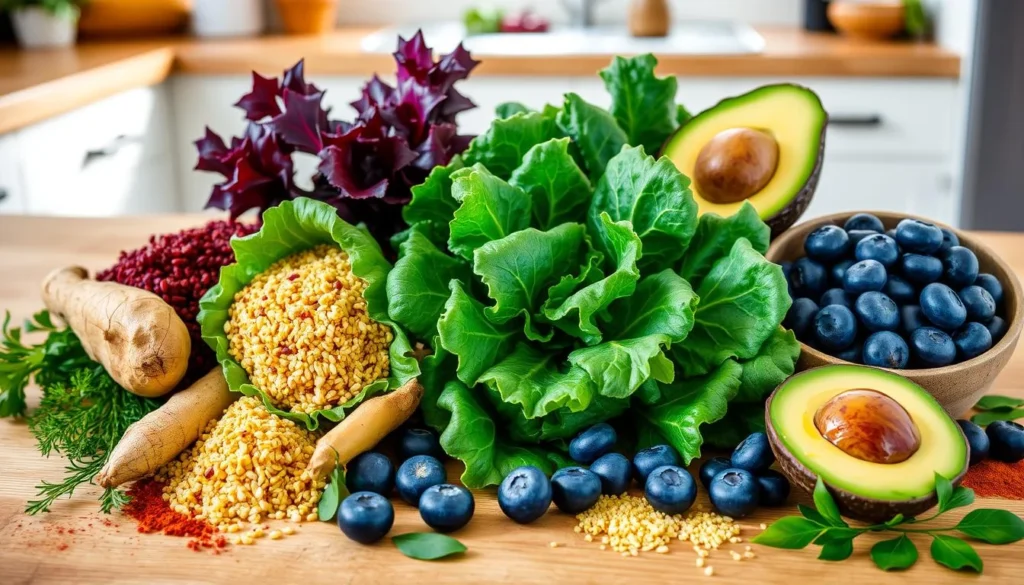Did you know 80% of Americans don’t eat enough fruits and veggies? This fact from the Centers for Disease Control and Prevention shows we need more nutrients in our diets. Superfoods are the answer – they’re packed with nutrients in every bite. These foods are not just trendy but key to a healthy diet.
Superfoods are full of vitamins, minerals, and antioxidants. They offer more health benefits than regular foods. Berries are full of compounds that fight diseases, while fatty fish are good for your heart. These foods can make your diet better and help prevent chronic diseases.
No single food can give you all the nutrients you need. However, adding superfoods to a balanced diet can greatly improve your health. These foods are not only full of nutrients; they’re also easy to add to your meals. They’re a tasty way to boost your immune system and heart health or eat better.
Key Takeaways
- Superfoods are nutrient-dense foods rich in vitamins, minerals, and antioxidants
- Incorporating superfoods can enhance overall health and reduce chronic disease risk
- A balanced diet with superfoods supports heart health and boosts the immune system
- Superfoods are versatile and can be easily added to daily meals
- Eating a variety of superfoods provides a wide range of health benefits
Understanding What Makes a Food “Super”
The term “superfood” has become popular lately. But what makes a food truly super? Let’s explore the key factors that make some foods stand out.
Defining Nutrient Density
Nutrient density is key in superfoods. These foods are rich in nutrients but low in calories. For example, dark green leafy veggies are full of folate, zinc, and more. A cup of kale gives you 680% of your daily vitamin K.
The Role of Antioxidants
Antioxidants are crucial in making a food “super.” They fight off harmful free radicals and stress. Berries, for instance, are full of antioxidants. They may help lower heart disease and cancer risks.
Beyond Marketing: Real Health Benefits
While “superfood” is often used in marketing, many foods do offer health benefits. Green tea, for example, is full of antioxidants like EGCG. It may help prevent heart disease and cancer. Turmeric, with its curcumin, has strong anti-inflammatory effects. It’s good for treating and preventing chronic conditions.
| Superfood | Key Nutrients | Potential Health Benefits |
|---|---|---|
| Blueberries | Fiber, Manganese, Vitamin K | Heart health, Brain function |
| Kale | Vitamin K, Vitamin C, Antioxidants | Bone health, Immune support |
| Green Tea | EGCG, Polyphenols | Stress reduction, Cancer prevention |
| Turmeric | Curcumin | Anti-inflammatory, Heart health |
Adding these nutrient-rich foods to a balanced diet can boost your health. Remember, eating a variety of foods is important. It helps you get all the nutrients and antioxidants you need.
Superfoods to Boost a Healthy Diet
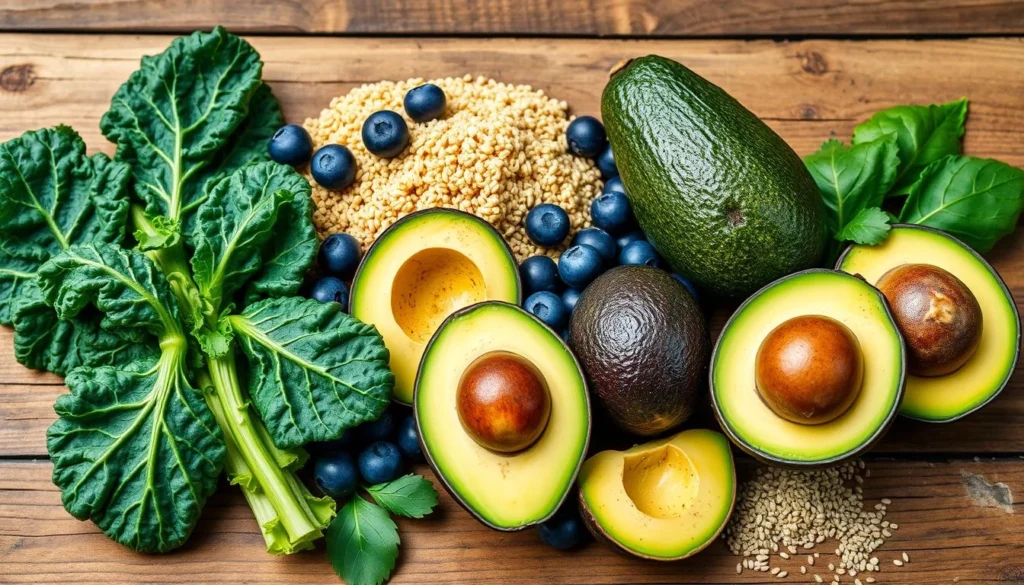
Superfoods are packed with nutrients, making them great for a healthy diet. They help prevent diseases and boost immunity. Let’s look at some of the best superfoods and what they do.
Berries like blueberries, strawberries, and raspberries are full of antioxidants. Eating half a cup of them four times a week can be very beneficial. Green tea is also a superfood, helping fight cancer and heart disease if you drink it every day.
Quinoa is a protein-rich seed with all nine essential amino acids. Olive oil, rich in omega-3s, is great for cooking. Nuts are full of anti-inflammatory properties, and Greek yogurt has more protein than regular yogurt.
| Superfood | Key Benefits | Recommended Intake |
|---|---|---|
| Berries | High in antioxidants | 1/2 cup, 4 times weekly |
| Green Tea | Potential cancer and heart disease fighter | 12-16 ounces daily |
| Quinoa | Complete protein source | 1/2 cup, 2-3 times weekly |
| Olive Oil | Rich in omega-3s and monounsaturated fats | Use as primary cooking oil |
| Nuts | Antioxidants and fiber | Small handful daily |
Adding these superfoods to your diet can make you healthier. A balanced diet with these foods is key to staying well and fighting diseases.
Blueberries: Nature’s Antioxidant Powerhouse
Blueberries are a true superfood, full of nutrients that are good for us. These small, vibrant berries are loaded with antioxidants, phytochemicals, and vitamins C and K. Their nutritional value makes them a great choice for improving our health.
Key Vitamins and Minerals
Blueberries are full of important nutrients. A 3.5-ounce serving gives you a big part of your daily vitamin C. They’re also packed with vitamin K, which is good for bones and blood clotting. Plus, their high fiber helps with digestion and weight management.
Disease-Fighting Properties
The antioxidants in blueberries, like anthocyanins, protect cells from harm. Studies show that eating blueberries can lower heart disease risk by reducing bad cholesterol. A study found that eating 10 ounces of blueberries protects DNA from damage in healthy men.
Creative Ways to Include Blueberries
It’s easy and tasty to add blueberries to your diet. Here are some ideas:
- Add them to your morning cereal or yogurt
- Blend them into smoothies for a nutrient boost
- Use them in baked goods like muffins or pancakes
- Mix them into salads for a sweet twist
If fresh blueberries aren’t available, frozen ones are just as good. They keep their antioxidants and phytochemicals, making them a healthy choice all year round.
Salmon: Essential Omega-3 Fatty Acids

Salmon is a nutritional superstar, packed with omega-3 fatty acids and protein. It’s a tasty way to boost heart health and overall wellness. The American Heart Association suggests eating fish like salmon at least twice a week for its benefits.
A 3-ounce serving of salmon has almost 2 grams of omega-3s. These fats are key in fighting inflammation and improving heart health. Salmon’s protein is great for keeping muscles strong and growing.
Cooking salmon is easy and flexible. Bake it in a 400-degree F oven for 15-20 minutes until it’s flaky. For a crispy outside, pan-sear it for about four minutes on each side. Poaching makes the fish tender and moist, taking around 15 minutes until it’s opaque.
| Nutrient | Amount per 3.5 oz (100g) |
|---|---|
| Omega-3 Fatty Acids (EPA and DHA) | 2,150 mg |
| Protein | 22-25 g |
| Vitamin B12 | 2.6 μg |
| Selenium | 31.7 μg |
If you don’t like fish, flaxseed, walnuts, and chia seeds are good plant-based omega-3 sources. But salmon’s mix of nutrients makes it special for health.
Avocados: Heart-Healthy Fats and Nutrients
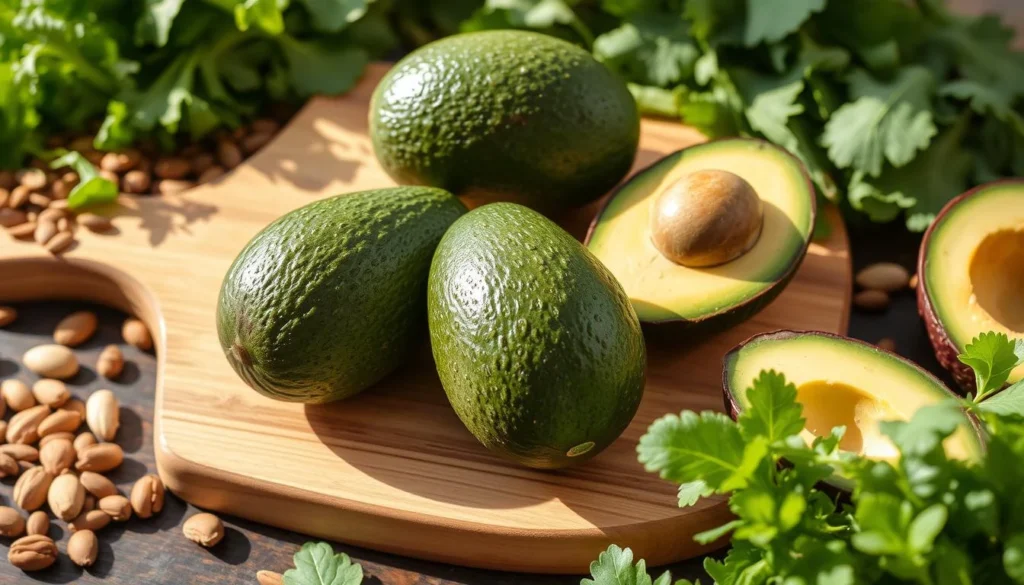
Avocados are a nutritional powerhouse. They are full of healthy fats and essential nutrients. These creamy fruits offer many health benefits and can be easily added to your daily diet.
Nutritional Profile
Avocados are rich in healthy fats, folate, vitamins C and K. A typical 7-ounce avocado contains:
- 30 grams of fat
- 4 grams of protein
- 17 grams of carbohydrates
- 14 grams of fiber
Half an avocado gives you 20% of the daily value for folate and 18% for vitamin K. These nutrients are key for fetal development and blood clotting.
Health Benefits
Avocados have many health benefits:
- Heart health: Avocados may lower heart disease risk and increase good HDL cholesterol.
- Weight management: Their high fiber and healthy fats help you feel full and may help with weight loss.
- Cancer prevention: Eating avocados regularly may lower the risk of colorectal, lung, and bladder cancer.
- Antioxidant boost: Avocados are full of antioxidants, which protect against chronic diseases.
Serving Suggestions
Avocados are versatile and can be enjoyed in many ways:
- Spread on toast for a nutritious breakfast
- Mashed into guacamole for a tasty dip
- Sliced in salads for added creaminess
- Blended into smoothies for a nutrient boost
With their creamy texture and mild flavor, avocados can make both savory and sweet dishes better. They are a great addition to a healthy diet.
Sweet Potatoes: Vitamin-Rich Root Vegetables
Sweet potatoes are full of vitamins A and C, fiber, and antioxidants. They are great for your health and can be added to many meals.
One serving of sweet potatoes gives you 102% of the vitamin A you need daily. Vitamin A is good for your eyes and might help prevent eye diseases. Sweet potatoes also have a lot of fiber, about 6.6 grams per cup, which helps your digestion.
They are also full of antioxidants like carotenoids and anthocyanins. These help protect your cells and might lower cancer risk. Purple sweet potatoes, in particular, have anthocyanins that could help prevent colon cancer.
- May help manage blood sugar levels
- Could lower LDL cholesterol, reducing heart disease risk
- Supports a healthy immune system
- Promotes gut health by encouraging beneficial bacteria growth
It’s easy to add sweet potatoes to your meals. You can bake, mash, or make fries out of them. They are sweeter than regular potatoes and can be used in many dishes.
“Sweet potatoes are not just tasty, they’re a nutritional powerhouse that can boost your overall health in numerous ways.”
Sweet potatoes are a must-have in your diet. They are tasty and packed with vitamins, fiber, and antioxidants. Enjoy them as a sweet treat that’s good for you.
Dark Leafy Greens: Nutrient Powerhouses
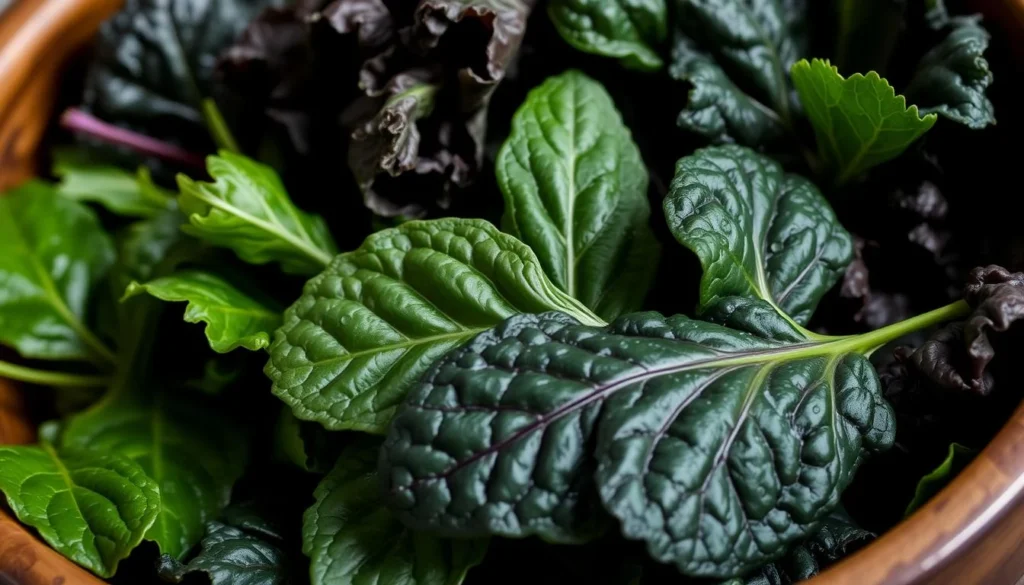
Dark leafy greens are true champions of nutrition. They are packed with vitamins, minerals, and antioxidants. Kale, spinach, and collard greens are just a few examples of these superfoods that can transform your diet.
Varieties and Their Benefits
Each type of dark leafy green offers unique health benefits. Kale, for instance, provides 68% of the daily value for vitamin K in just one cup. Spinach is equally impressive, offering 121% of the daily vitamin K requirement in a single serving. Collard greens are rich in fiber, protein, and various vitamins and minerals.
| Leafy Green | Nutrient Highlight | % Daily Value (per cup) |
|---|---|---|
| Kale | Vitamin K | 68% |
| Spinach | Vitamin K | 121% |
| Watercress | Vitamin K | 71% |
| Romaine Lettuce | Vitamin A | 23% |
Preparation Methods
Dark leafy greens are versatile in the kitchen. You can enjoy them raw in salads, blend them into smoothies, sauté them for a quick side dish, or add them to soups and stews. Experiment with different cooking methods to find your favorite way to incorporate these nutritional powerhouses into your meals.
Daily Intake Recommendations
The USDA recommends adults consume two to three cups of vegetables daily, with a focus on dark leafy greens. This intake helps ensure you’re getting a wide range of essential nutrients. Remember, variety is key – mix up your greens to benefit from their diverse nutritional profiles.
By making dark leafy greens a regular part of your diet, you’re taking a significant step towards better health and nutrition. These nutrient-dense foods offer an impressive array of vitamins and minerals that support overall well-being.
Incorporating Superfoods Into Your Daily Diet
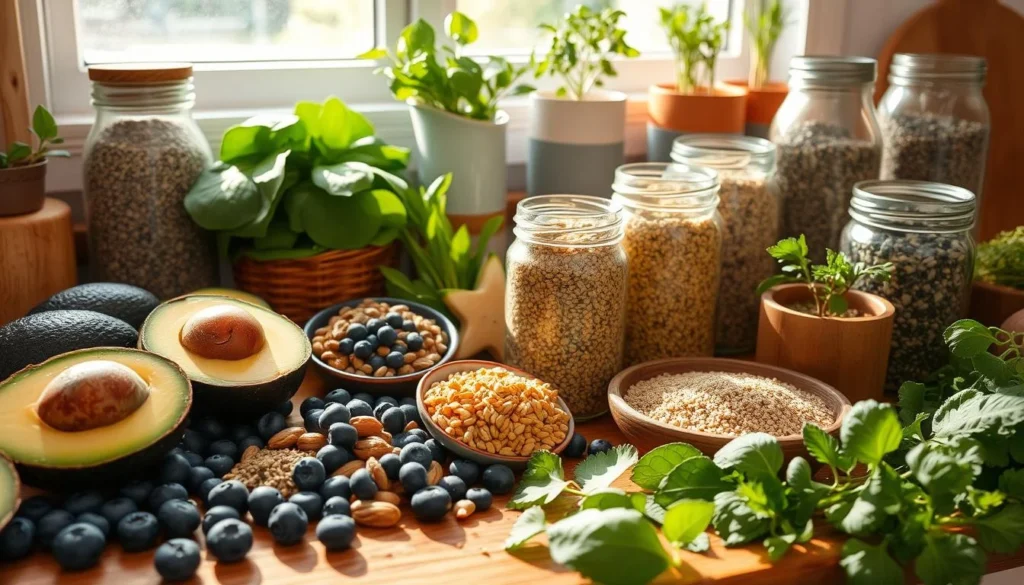
Adding superfoods to your meals is simple. With a little planning and prep, you can boost your diet’s health. Here are some easy tips to make superfoods a staple in your diet.
Meal Planning Tips
Good meal planning is essential for regular superfood use. Start by adding one or two superfoods to each meal. For breakfast, add berries to oatmeal or yogurt. At lunch, add dark leafy greens to salads or sandwiches. For dinner, include salmon or sweet potatoes as side dishes.
- Create a weekly menu featuring different superfoods
- Prep ingredients in advance for quick and easy meals
- Experiment with new recipes to keep meals exciting
Storage and Preparation
Right storage and prep keep superfoods nutritious. Store berries in the fridge and wash them just before eating. Keep nuts and seeds in airtight containers in a cool, dry place. Blanch leafy greens before freezing to preserve their nutrients.
Budget-Friendly Options
Eating superfoods doesn’t have to be expensive. Many affordable superfoods are rich in nutrients. Beans, lentils, and frozen berries are cheap and nutritious. Buy seasonal produce and look for sales to save money.
| Superfood | Cost per Serving | Key Nutrients |
|---|---|---|
| Beans | $0.20 | Protein, Fiber, Iron |
| Frozen Berries | $0.50 | Antioxidants, Vitamin C |
| Canned Sardines | $0.75 | Omega-3, Calcium |
By following these tips, you can easily add superfoods to your diet without spending a lot of money or time. Remember, the key is to be consistent in enjoying the health benefits of these nutrient-rich foods.
Common Myths About Superfoods
Superfoods have become very popular, but many myths surround them. Let’s look into the truth about these foods and how they fit into a healthy diet.
The term “superfood” isn’t officially defined. It’s mainly used to market products like kale juices and goji berry granola bars. While these foods are good for you, they’re not magic solutions.
Many believe superfoods alone can keep you healthy. But, a balanced diet with many nutrient-rich foods is essential. The Mediterranean diet, full of whole grains, fruits, veggies, and healthy fats, shows how to do it right.
Another myth is that more is always better. Research often uses high doses of nutrients that are hard to get in real life. For example, to match the cholesterol-lowering effects of garlic, you’d need to eat 28 cloves every day!
| Superfood Myth | Reality |
|---|---|
| Superfoods cure diseases | They support health but aren’t cures |
| Only exotic foods are “super” | Local produce can be equally nutritious |
| Superfoods replace other healthy foods | They complement a varied diet |
Remember, superfoods are great, but they work best as part of a balanced diet. Try to eat a variety of whole foods for the best nutrition.
Health Benefits and Disease Prevention
Superfoods are key to keeping us healthy and preventing diseases. They are packed with nutrients that help our hearts, boost our immune system, and fight inflammation.
Heart Health Support
Many superfoods are good for our hearts. Salmon, for example, is full of omega-3 fatty acids. These help keep our cholesterol levels in check and support heart function.
Nuts like almonds are also great for our hearts. They contain monounsaturated fats that are good for us. Just one ounce of almonds gives us a big part of our daily vitamin E.
Immune System Boost
Superfoods help strengthen our immune system. Berries are full of antioxidants that fight cell damage and prevent diseases. Oranges, with their high vitamin C, are also important for our immune health.
Broccoli is another superfood that’s good for our immune system. It has phytonutrients that help improve our immune health.
Anti-inflammatory Properties
Many superfoods have anti-inflammatory properties. Leafy greens like spinach and kale are full of vitamins and minerals that fight inflammation. Avocados, with their healthy fats and antioxidants, also help reduce inflammation in our bodies.
Eating these superfoods can greatly improve our health. They give us essential nutrients, support our body’s functions, and help prevent chronic diseases. A balanced diet with a variety of superfoods is the best way to enjoy their health benefits.
Conclusion
Superfoods are packed with nutrients that are vital for a healthy diet and lifestyle. We’ve seen how these foods can greatly improve our well-being. For example, blueberries are full of antioxidants, and salmon is rich in omega-3s.
Studies found 10 superfoods, like kale and spinach, that are widely praised. These foods are great for heart health, brain function, and fixing cells. Adding them to your meals, like smoothies or salads, can really enhance your diet.
Even though superfoods are great, they shouldn’t be the only thing you eat. A balanced diet includes fruits, veggies, lean proteins, and whole grains. By eating a variety of these foods, you’re on your way to a healthier, more vibrant life.
Source Links
- 10 Superfoods to Boost a Healthy Diet – https://blog.healthteamadvantage.com/member/10-superfoods-to-boost-a-healthy-diet
- SelectHealth – https://selecthealth.org/blog/2018/09/5-superfoods-you-should-be-eating
- Power Foods for Your Health – https://www.webmd.com/diet/superfoods-for-health
- 16 Superfoods That Are Worthy of the Title – https://www.healthline.com/nutrition/true-superfoods
- Superfoods: Health benefits, uses, and risks – https://www.medicalnewstoday.com/articles/303079
- Fourteen Superfoods To Add To Your Diet – https://www.piedmont.org/living-real-change/14-superfoods-to-add-to-your-diet
- 27 Must-Have Superfoods For Your Grocery List – https://www.verywellhealth.com/superfoods-8726545
- Top 10 Superfoods of 2024, According to Registered Dietitians – https://www.realsimple.com/health/nutrition-diet/healthy-eating/top-superfoods-according-to-dietitians
- 11 Reasons Why Berries Are Among the Healthiest Foods on Earth – https://www.healthline.com/nutrition/11-reasons-to-eat-berries
- Nature’s Powerhouse: The 7 Best Superfoods for Optimal Health and Vitality – https://medium.com/@dmguarini/natures-powerhouse-the-7-best-superfoods-for-optimal-health-and-vitality-e39824d770b9
- How eating fish helps your heart – https://www.mayoclinic.org/diseases-conditions/heart-disease/in-depth/omega-3/art-20045614
- 12 Foods That Are Very High in Omega-3 – https://www.healthline.com/nutrition/12-omega-3-rich-foods
- Superfood Spotlight: Salmon – Mindful by Sodexo – https://www.mindful.sodexo.com/superfood-spotlight-salmon/
- 12 health benefits of avocado – https://www.medicalnewstoday.com/articles/270406
- 7 Health Benefits of Avocados – https://www.healthline.com/nutrition/avocado-nutrition
- Health Benefits of Sweet Potatoes – https://www.webmd.com/food-recipes/benefits-sweet-potatoes
- Sweet potatoes: Nutrition and Health Benefits – https://www.healthline.com/nutrition/sweet-potato-benefits
- The 13 Healthiest Leafy Green Vegetables – https://www.healthline.com/nutrition/leafy-green-vegetables
- Dark Leafy Greens are a ‘Powerhouse’ of Nutrition. Here’s Why – https://vegnews.com/dark-leafy-greens-powerhouse-nutrition
- How to Incorporate Superfoods into Everyday Meals – Healthy Blog – https://foodtolive.com/healthy-blog/how-to-incorporate-superfoods-into-everyday-meals/?srsltid=AfmBOooPfr7gWOxHe97s7X-14Q2aevsbswhqXFNd-rdsjpkZaVgfzIS7
- What are the most effective ways to incorporate superfoods into your diet? – https://www.linkedin.com/advice/3/what-most-effective-ways-incorporate-superfoods-5jyof
- 6 Superfoods to Incorporate Into Your Daily Diet – MercyOne Iowa Heart Vein Center – https://www.veincenteratiowaheart.com/blog/6-superfoods-to-incorporate-into-your-daily-diet/
- Superfoods: Myth or Reality? | Dietitian Nutritionist – https://teamnutrition.ca/blog-nutritionist-dietitian/superfoods-myth-or-reality
- The Myth of ‘Superfoods’ – https://www.growveg.com/guides/the-myth-of-superfoods/
- What are ‘superfoods,’ and do they live up to the hype? – https://www.medicalnewstoday.com/articles/superfoods-fad-or-fact
- 10 great health foods – https://www.mayoclinic.org/healthy-lifestyle/nutrition-and-healthy-eating/in-depth/10-great-health-foods/art-20546837
- Superfoods for a Healthy Lifestyle – https://www.resultspt.com/blog/posts/superfoods-for-a-healthy-lifestyle
- Blog • Superfoods? Super Good for You. – https://www.montgomerycountypa.gov/Blog.asp?IID=126
- ‘Superfoods’: Reliability of the Information for Consumers Available on the Web – https://pmc.ncbi.nlm.nih.gov/articles/PMC9914617/
- Aging Gracefully: The Role of Superfoods in the Senior Diet – Total Life – https://totallife.com/role-of-superfoods-in-the-senior-diet/

